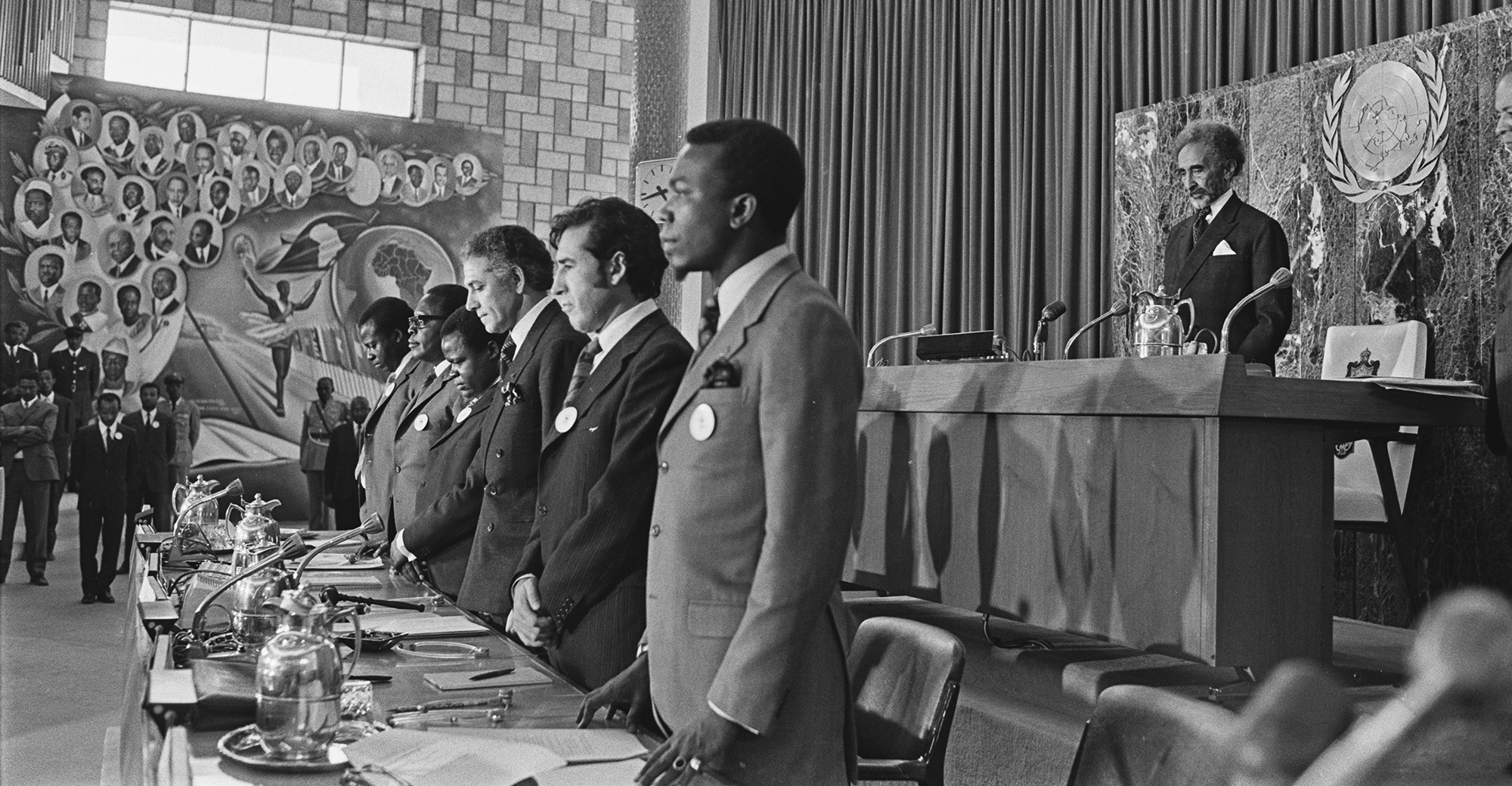When the Organisation of African Unity (OAU) was founded 60 years ago on 25 May 1963, the world was in the grip of the Cold War. The British and French empires were tired and bankrupt, and London and Paris had begun granting independence to their former colonies, spurred on by nationalist movements.
In 1963, there were just 32 independent African states, most only recently decolonised. The overarching aim of the OAU was to see the rest of the continent liberated, but leaders had different conceptions of what this pan-African organisation should look like, which have been echoed in later generations.
The founding fathers (yes, they were all men) wanted a forum to discuss common challenges, exercise solidarity and increase Africa’s presence on the international stage.
Today, Africa has 55 states (including the Sahrawi Arab Democratic Republic, although its territory is mostly occupied by Morocco), and seeks ever-greater unity and integration through the African Continental Free Trade Agreement (AfCFTA).
Back in 1963, there were two main groups of states contending to shape the OAU, known as the Monrovia Bloc and the Casablanca Bloc. The Monrovia Bloc was mainly composed of moderate, Anglophone African countries, which preferred a gradual, incremental approach to achieving African unity. It took its name from a meeting held in the Liberian capital in 1961. This bloc sought economic unity before political unity, promoted non-interference in internal affairs, and advocated for close cooperation with former colonising states.
 The Addis Ababa Hilton, the venue for the conference of the Organisation of African Unity in Addis Ababa, Ethiopia, on 6 February 1973. (Photo: William Lovelace / Express / Hulton Archive / Getty Images)
The Addis Ababa Hilton, the venue for the conference of the Organisation of African Unity in Addis Ababa, Ethiopia, on 6 February 1973. (Photo: William Lovelace / Express / Hulton Archive / Getty Images)
The Casablanca Bloc was named after the Moroccan city, and represented mostly Francophone states, which desired a more radical and centralised path to Africa’s liberation. This group called for the immediate creation of a continental pan-African government and a unified African army. They were strongly supportive of liberation movements fighting for independence and advocated for the total eradication of racial discrimination, apartheid and domination of Africa by foreign powers.
Compromises were reached and elements of both blocs’ ideas went into the OAU Charter. There was a gradualist approach to political unity, and strong support for liberation movements, especially in southern Africa, and the sanctity of sovereignty within colonial-era national boundaries.
The approaches of these two camps were largely mirrored in the late 1990s and early 2000s when talks commenced on transforming the OAU into the African Union (AU).
Establishment of the African Union
It was widely held that while the decolonisation aim had been accomplished, the OAU had a poor record on human rights and advancing the development of the continent. Libya’s Muammar Gaddafi favoured declaring a “United States of Africa” immediately, while South Africa’s Thabo Mbeki advocated a gradual transformation.
The Mbeki ideas won out, after vigorous debate. His thinking was fundamental in the establishment of several important AU institutions including its Peace and Security Council, the New Partnership for Africa’s Development, the African Peer Review Mechanism and the Pan-African Parliament. The AU was officially launched in Durban on 9 July 2002.
In recent years, the AU has embarked on a reform process, championed by Rwanda’s president Paul Kagame. Leaders recognised that the AU was too dependent on European funding and that the proportion of African funding should increase. It was also decided to combine the AU’s Political Affairs department with its Peace and Security department to ostensibly increase efficiency. However, this merger has not gone smoothly, with job uncertainty, resignations and many senior posts vacant in the new department of Political Affairs, Peace and Security.
Despite Kagame’s call for a leaner, more focused institution, the AU continues to have an extremely wide remit and carries a bloated bureaucracy, inherited from the OAU days.
The AU’s theme for 2023 is “Accelerating implementation of the AfCFTA to bring greater prosperity to the continent.” This broad trade agreement seeks to make the entire continent a prosperous single market, able to compete favourably in international trade.
The AfCFTA was ratified and brought into being in record time by a record number of states, illustrating their enthusiasm and political will for transforming trade and the lives of millions. Negotiations are ongoing around the finer details of the agreement.
One of the biggest sticking points is the free movement of people, which is being resisted by many states. Without it, however, a truly integrated market like the European Union will remain illusory. And if the AfCFTA works, it’s a game changer.
The AU theme also reflects a reality: Africa is not short on good ideas, but frequently fails to put them into practice. The African Peer Review Mechanism measures its members’ adherence to nearly 100 standards and codes. While ratification and adoption levels vary vastly from country to country, there is a common pattern of policy non-implementation across countries.
The AU’s Agenda 2063: The Africa we want — the 50-year vision for the continent’s development — remains aspirational rather than meaningfully realised. The noble but naïve aim to “Silence the Guns” in Africa by 2020 was pushed back a decade.
At this time of reflection, citizens need more from their leaders for a healthy and wealthy continent to emerge. DM
Steven Gruzd is Head of the African Governance and Diplomacy Programme at the South African Institute of International Affairs (SAIIA).




 The Addis Ababa Hilton, the venue for the conference of the Organisation of African Unity in Addis Ababa, Ethiopia, on 6 February 1973. (Photo: William Lovelace / Express / Hulton Archive / Getty Images)
The Addis Ababa Hilton, the venue for the conference of the Organisation of African Unity in Addis Ababa, Ethiopia, on 6 February 1973. (Photo: William Lovelace / Express / Hulton Archive / Getty Images)